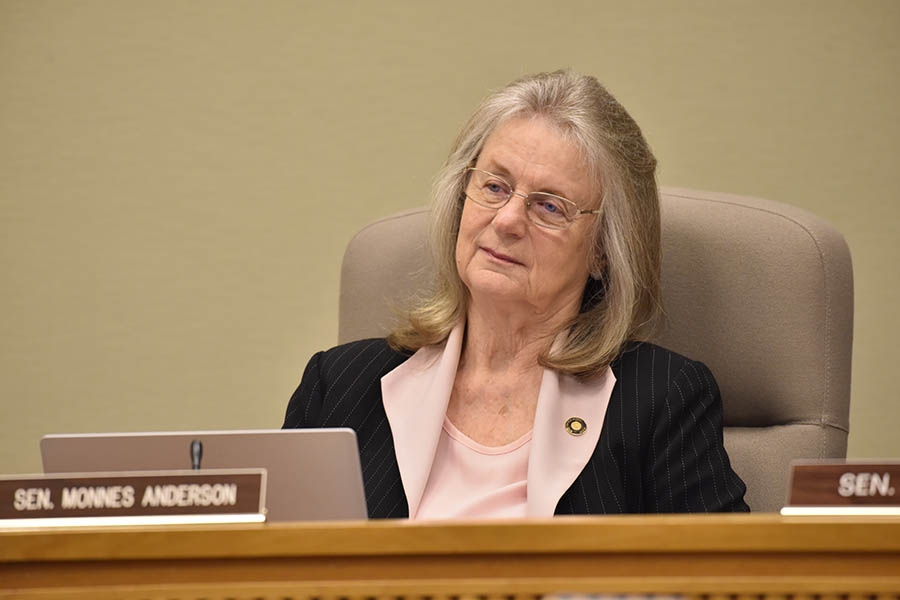Sen. Laurie Monnes Anderson was the decisive Democratic vote that killed cap and trade in Oregon. The Multnomah County Democrat insists she’s still on the right side of history.
It seemed like a sure thing, mathematically speaking. The Republican walkout, theatrical as it may have been, was mere sound and fury. The votes were there, Democrats in Salem believed, as did the bill’s opponents, who were already preparing for the effect of cap and trade. Victory in the Senate seemed certain for Oregon’s HB 2020.
Democratic senators Betsy Johnson and Arnie Roblan already had their hands tied on the matter; both senators had received money from timber suppliers that fought against HB 2020. Stimson Lumber CEO Andrew Miller even engaged in an arm-twisting campaign, causing Deschutes Brewery and Dutch Bros. Coffee to abandon their support for the climate legislation.
Still, Sens. Johnson and Roblan could breathe easy. The Democrats didn’t need them. The votes to pass HB 2020 were there, albeit in exact change, and they could still cast a vote on the floor to show their donors they did what they could to stop cap and trade.
Then, in an act mirroring the late John McCain’s slaying of the Republicans’ repeal of the Affordable Care Act, Democrat Laurie Monnes Anderson, representing liberal Multnomah County, announced her “no” vote, effectively killing the bill approved by the House. Anderson’s decision was baffling to some. Her district has gone blue every election since she defeated Ron Sunseri in 2004.
Sen. Monnes Anderson’s reversal on HB 2020 stemmed from a perceived bias against large employers such as Safeway, Albertsons and Boeing, which do not buy their energy from investor-owned utilities.
“The way HB 2020 was written, Boeing would have to pay an extra $10,000 to $12,000 a year for gas, which is nothing; but with electricity, they would pay over a million dollars,” says Sen. Monnes Anderson. “Everyone needs to be treated equitably,” she said.. [Larger companies] need to be treated the same way as companies who buy their utilities from investor-owned companies like PGE.”
The bill offered electric utilities free allowances in the early years of the program to soften the impact of higher electricity rates. When pressed on the specifics of what compromise could be made on the issue, Sen Monnes Anderson replied: “I’m not into the nitty-gritties of it.”
Despite HB 2020’s demise, Gov. Kate Brown continues to explore executive action on cap and trade, adding she has a public mandate to address climate change. Oregonians overwhelmingly support carbon-reducing legislation. A study commissioned by the Nature Conservancy found 71% of Oregonians support cap-and-trade laws. Even when pressed, a majority of respondents still supported taking action when it meant paying more personally.
For all the tumult Sen. Monnes Anderson’s turnabout may have caused, the maverick senator was adamant she hasn’t abandoned the fight against climate change. While she was unclear what precisely would need to be included for cap and trade to have her support, Sen. Monnes Anderson seemed fully aware of the precarious position she’s put herself in with Democratic voters.
“I’ve always said I would vote for a climate bill. I’m a public health nurse, for crying out loud,” she says. “I wanted to vote for it.”
Given the overwhelming popularity of climate-change solutions with Oregon voters, cap-and-trade legislation might not be a matter of if so much as when. Of course, when it comes to climate change, “when?” is the trillion-dollar question.
HB 2020 is dead and no replacement has yet to be unveiled. Until then, Gov. Brown will continue efforts to enact what she believes to be the will of the voters, and Democrats who voted against cap and trade could be staring down the ballot box.
To subscribe to Oregon Business, click here.









